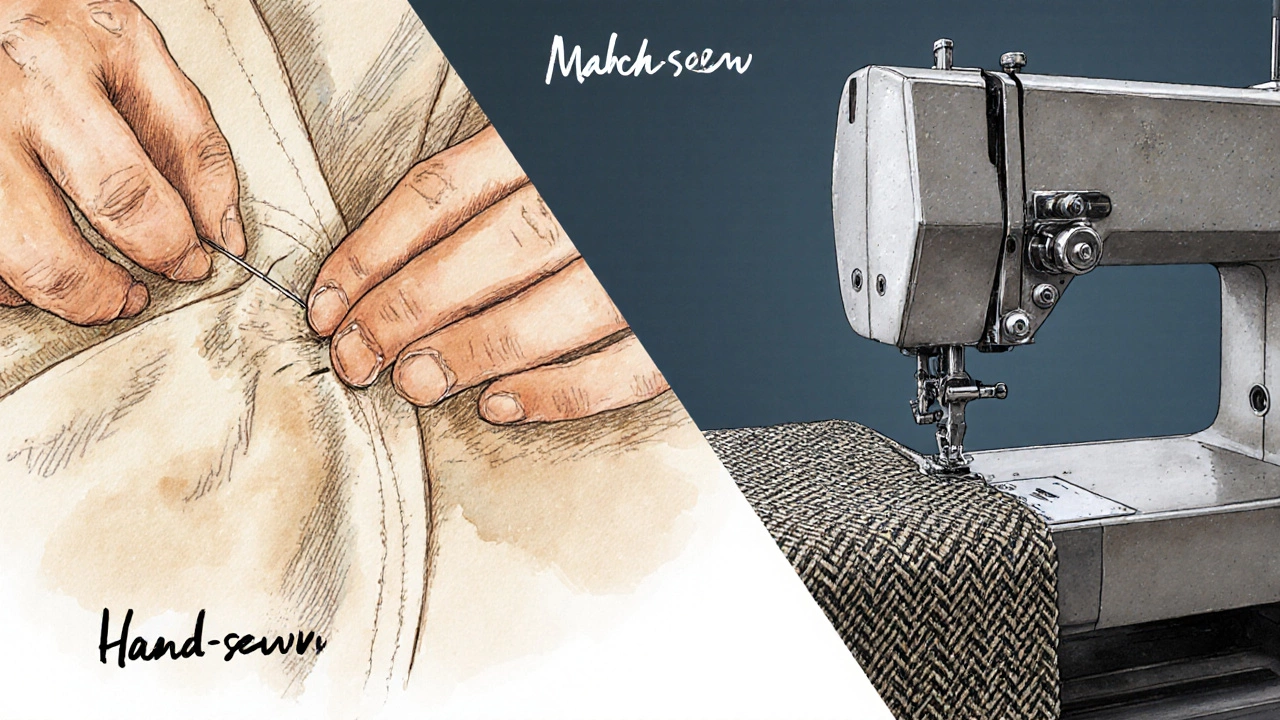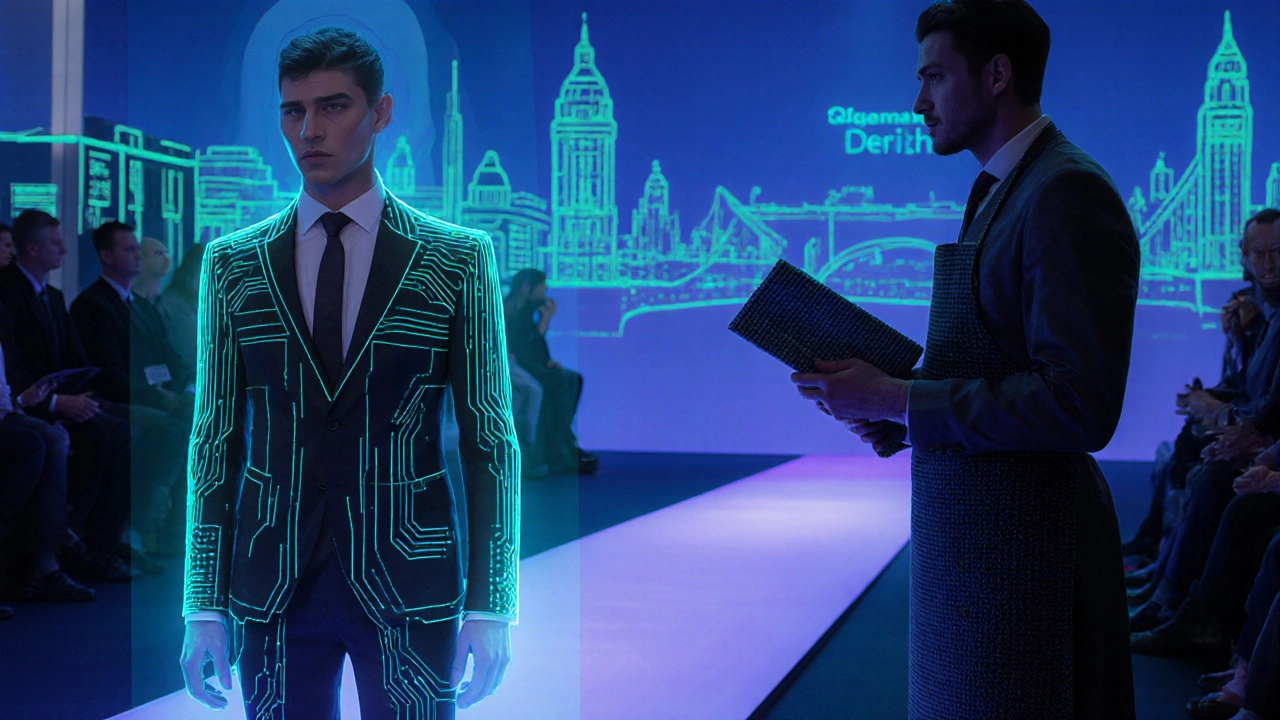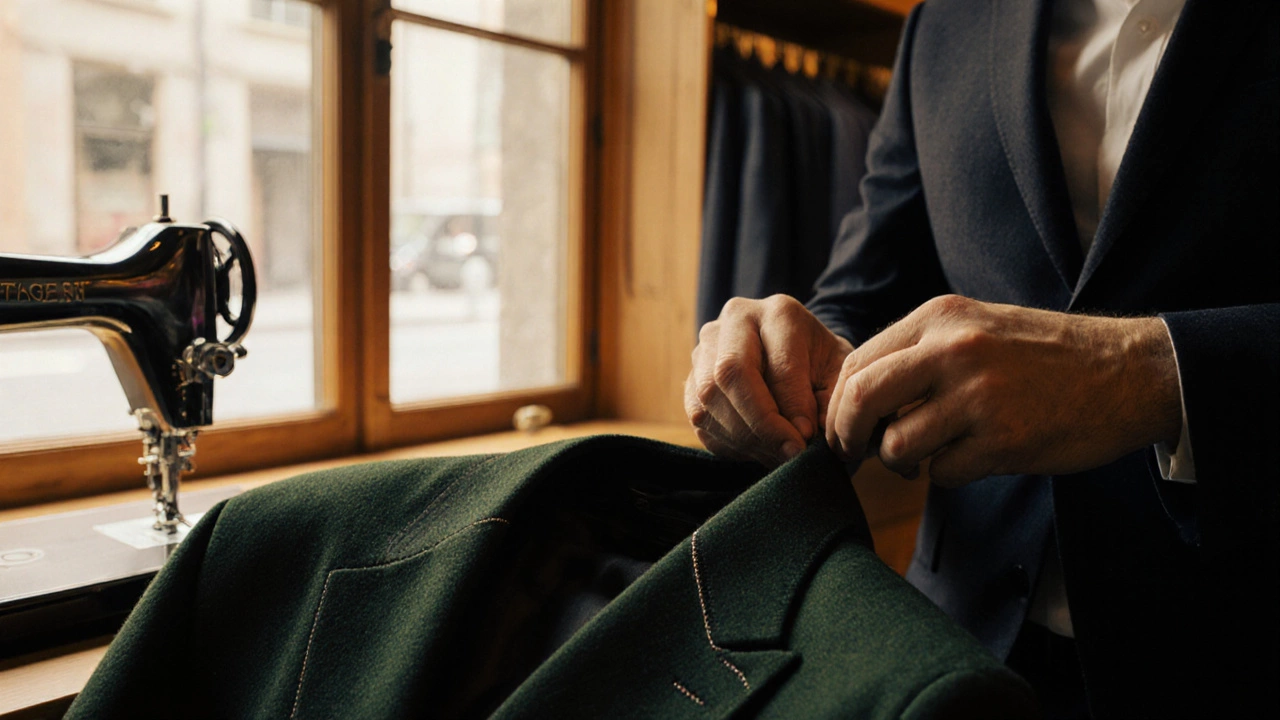Hand-Sewn vs Machine-Sewn Suit Comparison Tool
- Fit: Fully bespoke with multiple fittings
- Price: €1,200 – €2,500+
- Fabric: Fine wools, linen, cashmere
- Durability: High; hand-stitches flex with fabric
- Time: 4-8 weeks (including fittings)
- Retailers: Grafton Tailors, Aidan Kelly Bespoke
- Fit: Standard sizes; minimal adjustments
- Price: €250 – €600
- Fabric: Heavy tweed, wool blends, polyester mixes
- Durability: Good; depends on stitch type
- Time: Immediate or 1-2 weeks
- Retailers: Brown Thomas, Zara Ireland
Use this guide to determine which suit type suits your needs:
Recommendation:
Pro Tip for Irish Buyers
Always check the stitching inside the jacket seam. Hand-sewn stitches will appear irregular and slightly raised, while machine stitches are uniform and flat.
When you step into a Dublin boutique or a Galway tailor shop, the first thing you notice is the quality of the suit on display. In Ireland, where a well‑cut suit still carries the weight of tradition at business meetings, weddings, and even the occasional St.Patrick’s Day parade, the question of how the suit was constructed matters. Hand‑sewn suit is a garment stitched together primarily by a tailor’s needle, while a machine‑sewn suit relies on industrial sewing machines for most of its seams. Both have loyal fans, but which option truly delivers the fit, durability, and elegance that Irish buyers crave?
Key Takeaways
- Hand‑sewn suits offer superior fit and detailing, making them ideal for bespoke orders in Dublin, Cork, and beyond.
- Machine‑sewn suits are faster to produce, more affordable, and still provide good quality for off‑the‑rack purchases.
- Consider fabric type, intended use, and budget when choosing between the two methods.
- Irish tailoring houses such as Grafton Tailors and Aiden Kelly Bespoke still champion hand‑sewing for premium clients.
- Maintenance differs: hand‑sewn suits often need professional pressing, while machine‑sewn pieces can handle more casual care.
Understanding the Two Construction Methods
At the heart of any suit lie its seams. A hand stitch is typically a small, invisible stitch that a tailor makes by hand, allowing for adjustments on the fly. In contrast, a machine stitch is uniform, fast, and ideal for mass production.
In Ireland’s bustling tailoring scene, the hand‑sewn approach is often reserved for bespoke suits. These are crafted after multiple fittings, with the tailor taking precise measurements and making minute alterations at each stage. Machine‑sewn suits, on the other hand, dominate the ready‑to‑wear market found in department stores like Brown Thomas or high‑street retailers such as Zara.
Fit and Comfort: Why Hand‑Sewing Wins for Custom Tailoring
Fit is everything in Irish business culture, where a sharp silhouette signals professionalism. Hand‑sewn construction lets a tailor adjust the shoulder slope, armhole depth, and waist taper on the spot. This results in a suit that moves with you-important when you’re navigating crowded pubs in Dublin or stepping onto a stage at the Galway Arts Festival.
For example, Aiden Kelly Bespoke in Dublin offers a three‑session fitting process. During each session, the tailor hand‑sews temporary basting stitches, evaluates how the fabric drapes, and reshapes the pattern accordingly. The final product often features a hand‑stitched lapel roll, a detail that a machine‑sewn suit typically cannot replicate.

Durability and Longevity: What the Stitch Type Means Over Time
Irish weather can be unforgiving-think damp Atlantic breezes and sudden rain showers. A suit that can withstand these conditions will serve you longer. Hand‑sewn stitching, especially the famed hand‑overlock, is flexible and less prone to breaking under repeated stress. This translates to jackets that retain their shape after many trips on the Dáil bench or after a full day of networking at the Cork Chamber of Commerce.
Machine‑sewn suits use straight seams that can split at stress points, especially on cheaper fabrics. However, modern high‑speed sewing machines equipped with reinforced stitches (e.g., double‑needle chain stitch) have closed the gap significantly. If the suit is made from premium Irish wool or Donegal tweed, a machine‑sewn version can still last a decade with proper care.
Cost Considerations: Budgeting for the Irish Market
Price is a decisive factor for many in Ireland, especially for students or young professionals in cities like Limerick. Hand‑sewn bespoke suits often start at €1,200, with premium fabrics pushing the price above €2,500. Machine‑sewn suits from major retailers range between €250 and €600, making them accessible for a first‑time suit buyer.
But the cost‑to‑value ratio can tip in favor of hand‑sewn pieces. A well‑crafted hand‑sewn suit may require fewer alterations over time, saving money on future tailoring sessions. Moreover, the prestige associated with wearing a bespoke suit at events like the Dublin International Film Festival can outweigh the initial expense.
Fabric Choices: Irish Materials Meet Stitch Techniques
Ireland boasts a rich textile heritage. From the soft, breathable linen of County Kerry to the heavyweight Donegal tweed, the fabric you choose influences the stitching method. Hand‑sewn suits pair beautifully with delicate fabrics such as fine merino wool, where the tailor can subtly shape the garment without pulling on the yarn. Machine‑sewn suits handle robust fabrics like heavy tweed more efficiently, as the strong threads accept the high‑speed stitching.
Local mills like the Irish Woollen Mills in Co.Leitrim supply premium wool, often used by bespoke tailors. When you buy a suit made from this fabric, you’re supporting domestic industry-a point that resonates with many Irish consumers.

Practical Tips for Irish Shoppers
- Know your purpose. If the suit is for a one‑off event like a wedding in Kilkenny, a high‑quality machine‑sewn option may suffice. For daily office wear in Dublin’s financial district, invest in a hand‑sewn bespoke suit.
- Check the stitching. Look inside the jacket seam. Hand‑sewn stitches will appear irregular and slightly raised, while machine stitches are uniform and flat.
- Ask about lapel construction. Hand‑sewn lapels often have a softer roll and better canvas support, enhancing drape.
- Consider after‑care. Hand‑sewn suits benefit from professional pressing at a reputable Irish dry‑cleaner such as Jeeves of Dublin. Machine‑sewn suits can handle more casual ironing at home.
- Budget for fittings. Even a machine‑sewn suit may need a simple alteration, costing €30‑€70 at local tailors like The Tailor’s Needle in Cork.
Comparison Table: Hand‑Sewn vs Machine‑Sewn Suits (Irish Context)
| Aspect | Hand‑Sewn Suit | Machine‑Sewn Suit |
|---|---|---|
| Fit customization | Fully bespoke; multiple fittings | Standard sizes; minimal adjustments |
| Typical price (Ireland) | €1,200-€2,500+ | €250-€600 |
| Fabric compatibility | Fine wools, linen, cashmere | Heavy tweed, wool blends, polyester mixes |
| Durability | High; hand‑stitches flex with fabric | Good; depends on stitch type |
| Production time | 4‑8 weeks (including fittings) | Immediate (off‑the‑rack) or 1‑2 weeks for simple alterations |
| Typical Irish retailers | Grafton Tailors, Aidan Kelly Bespoke, The Tailor’s Needle | Brown Thomas, Arnotts, Zara Ireland |
When to Choose Each Option
Hand‑sewn suits shine when you need a lifelong wardrobe piece, a perfect fit for a high‑profile event, or when you want to support local Irish craftsmanship. Think of a senior executive presenting at the Irish Times Business Summit or a groom walking down the aisle at a castle wedding in County Clare.
Machine‑sewn suits are the smart choice for budget‑conscious shoppers, those needing a suit quickly, or anyone who prefers a low‑maintenance garment for occasional use-like a student attending a formal dinner at Trinity College.

Maintenance and Care in the Irish Climate
The Irish climate demands a thoughtful approach to suit care. Hand‑sewn suits, because of their delicate stitching, respond best to professional cleaning. A dry‑cleaner experienced with Irish wool, such as Suds & Co. in Galway, knows how to preserve the hand‑stitched seams and canvas.
Machine‑sewn suits can be spot‑cleaned at home, but always follow the care label. A light steam from a handheld steamer helps remove dampness after a rainy commute without risking shrinkage.
Future Trends: Technology Meets Tradition
Even in Ireland, technology is influencing suit making. Some tailors now incorporate 3‑D body scanning to create a digital pattern before hand‑sewing the final piece. This hybrid approach speeds up the process while retaining the hand‑stitched quality.
Meanwhile, machine manufacturers are introducing smart stitching techniques that mimic hand‑sewn flexibility, giving retailers a middle ground. Keep an eye on Dublin Fashion Week showcases for the latest in Irish suit innovation.
Frequently Asked Questions
Is a hand‑sewn suit always more expensive than a machine‑sewn one?
Generally, yes. Hand‑sewn suits involve more labor and personalized fittings, so prices start around €1,200 in Ireland. However, sales or clearance events at bespoke tailors can occasionally bring costs closer to high‑end machine‑sewn suits.
Can I get a hand‑sewn suit made from a cheap fabric?
Technically you can, but most Irish tailors advise against it because the cost of hand‑sewing won’t be justified by a low‑quality material. The fabric should be at least a medium‑weight wool or a blend that holds its shape.
How long does a hand‑sewn bespoke suit take to complete?
From the first measurement to final delivery, expect 4‑8 weeks in Dublin or other Irish cities. This includes three fitting appointments where the tailor makes hand‑stitched adjustments.
Do machine‑sewn suits look cheap?
Not necessarily. High‑quality machine‑sewn suits from reputable Irish retailers can look sharp and last years when cared for. The key is fabric choice and proper tailoring.
What should I look for when inspecting the stitching?
Hand‑sewn stitches appear slightly uneven and raised, indicating flexibility. Machine stitches are even and flat. Check both the inside and outside seams, especially the side seams and lapel.
Next Steps for Irish Suit Shoppers
If you’re leaning toward a hand‑sewn bespoke experience, start by booking a consultation with a local tailor. Bring inspiration photos-maybe a classic suit you saw at the Royal Dublin Society event-to help convey your style.
For a quicker solution, visit an Irish department store, feel the fabrics, and ask the staff about the construction method. Many retailers can point out hand‑stitched details on premium lines.
Either way, understanding the differences will ensure you walk out of the fitting room feeling confident-whether you’re heading to a boardroom in the IFSC or a summer garden party in Kinsale.
